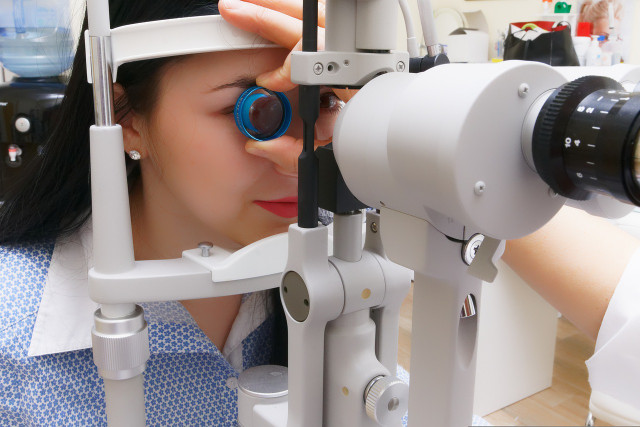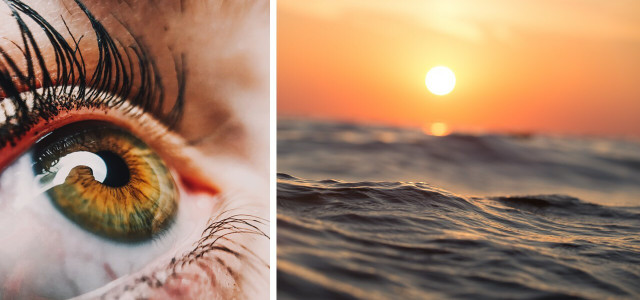Sunburned eyes can be a painful and sometimes serious injury. Find out more about it and how to avoid damaging your eyes and vision.
Photokeratitis — or sunburned eyes — is an inflammatory response affecting the cornea — the clear layer of the eyeball in front of the pupil.
In a nutshell:
- Cause: Photokeratitis is caused by unprotected exposure of the eyes to ultraviolet (UV) light
- Diagnosis: It can be diagnosed by an ophthalmologist.
- Symptoms: Sunburned eyes commonly accompany a sunburned face and a history of unprotected exposure to sun or light. Symptoms can vary from a mild irritation, to severe pain and discomfort. The longer the exposure to UV light, the more severe the symptoms can be.
The condition usually only lasts a few days and is rarely serious, however, unless symptoms are extremely mild, it is important to seek medical advice if you suspect you have sunburned eyes.
Causes of Sunburned Eyes

(Foto: CC0 / Pixabay / JillWellington)
Sunburned eyes usually happen as a result of inappropriate — or no — eye protection. The Cleveland Clinic warns that UV rays, UVA and UVB in particular, from the sun can cause short and long-term effects to the eyes and even damage vision and burn the retina. They and The College of Optometrists list exposure to the following as the most common causes for the condition:
- Direct sunlight
- Sun’s glare from snow, ice, cement, sand or water
- Welding arcs
- Tanning lamps
- Therapeutic high intensity UV for skin conditions or seasonal affective disorder
- Germicidal UV lamps
- Laser light
- Mercury vapor lamps, halogen desk lamps
- Lightning, electric sparks
- Photographic flood lamps
- Travelling
Symptoms of Mild and Severe Cases



(Foto: CC0 / Pixabay / victoruzihben)
Symptoms do not usually occur immediately and usually develop between six and 12 hours after exposure. In some more serious cases, onset can occur within one hour. The most common symptoms in mild cases include:
- Irritation
- Mild redness in the eyes
- Discomfort
- Tearing/watery eyes
Severe cases:
- Pain
- Severe redness
- Light sensitivity
- Swelling
- Blurring of vision
- Twitching of the eyelids
- Gritty sensation in the eyes
- Temporary loss of vision
- Seeing halos
- Headaches
- Temporary vision loss (rare)
- Color changes in your vision (rare)
Treatment of Photokeratitis



(Foto: CC0 / Pixabay / newarta)
How sunburned eyes are treated will depend on the severity of the injury. Immediate management involves going indoors or away from the light source. Remain in as much darkness as possible and remove lenses if you wear them. Avoid touching or rubbing the eyes. Placing a cold cloth over the eyes may relieve discomfort. Wear sunglasses as often as possible as you heal.
If you seek medical advice, you might just have your eyes examined and find that you do not require any further intervention. Mild photokeratitis will heal in 24–72 hours. An ophthalmologist can determine how much injury occurred to your eyes and advise accordingly. If the burn is moderate to severe, you might receive some of the following treatments that are commonly used:
- Irrigation of the eyes
- Topical antibiotic drops
- Topical pain-relieving drops
- Application of a pressure dressing is controversial as research supporting the practice is mixed.
- Patching the eyes is also yielding mixed results, so your healthcare provider may not apply anything to or over the eyes.
Preventing Sunburned Eyes



(Foto: CC0 / Pixabay / Pexels)
- Always use appropriate eye protection, such as sunglasses or snow goggles that block UV rays and meet the American National Standards Institute (ANSI) sunglasses requirements.
- Always wear appropriate eye protection if welding or working with UV lights and lasers.
- Remember that glare from the snow, sand or water can cause burns to the eyes even if it is cloudy and dull.
- Avoid looking at direct sunlight or solar eclipses.
- Wear a wide-brimmed hat or visor when you go outdoors for long periods.
- Ask your eye care specialist about UV absorbing contacts if you wear them.
- See your eye care specialist at least once a year for a complete eye exam.
Read more:
- The 8 Best Sun-Loving Plants to Add to Your Garden
- Home Remedies for Dry Eyes: Natural Methods for Quick Relief
- Itchy Eyes: 5 Home Remedies, Causes, and How to Avoid
Important Information regarding Health-related Topics.
** Links to retailers marked with ** or underlined orange are partially partner links: If you buy here, you actively support Utopia.org, because we will receive a small part of the sales proceeds. More info.Do you like this post?








